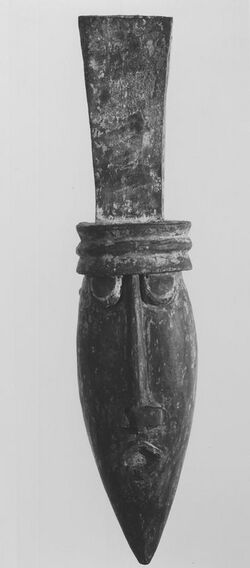Religion:Water spirit
From HandWiki
Short description: Elemental spirit associated with water
A water spirit is a kind of supernatural being found in the folklore of many cultures:
African
Some water spirits in traditional African religion include:
- Mami Wata is a transcultural pantheon of water spirits and deities of the African diaspora. For the many names associated with Mami Wata spirits and goddess, see Names of Mami Wata.[1]
- Owu Mmiri of some riverine people of Nigeria are often described as mermaid-like spirit of water.[2]
- A jengu (plural miengu) is a water spirit in the traditional beliefs of the Sawa ethnic groups of Cameroon, particularly the Duala, Bakweri, and related Sawa peoples. Among the Bakweri, the name is liengu (plural: maengu).
- A simbi is a mermaid-like or reptilian spirits from Kongo tribe and related to Vaudou religion.
Celtic
In Celtic mythology:
- An Each uisge is a particularly dangerous "water horse" supposed to be found in Scotland;[3] its Irish counterpart is the Aughisky.
- The Gwragedd Annwn are female Welsh lake fairies of great beauty.
- A Kelpie is a less dangerous sort of water horse. There are many similar creatures by other names in the mythology including:
- Morgens, Morgans or Mari-Morgans are Welsh and Breton water spirits that drown men.
- Selkie
Germanic
In Germanic mythology:
- The Nixie (English) or the Nix/Nixe/Nyx (German) are shapeshifting water spirits who usually appear in human, or horse, form
- The Undine or Ondine is a female water elemental (first appearing the alchemical works of Paracelsus)
- Jenny Greenteeth in the folklore of Lancashire
- Peg Powler said to inhabit the River Tees in Yorkshire
- The grindylow in the folklore of both Lancashire and Yorkshire.
Ancient Greek
In Greek mythology:
- Naiads were nymphs who presided over fountains, wells, springs, streams, and brooks
- Nereids were sea nymphs.
- Sirens were bird-bodied women living in the sea near a rocky island coastline.
Japanese
In Japanese folklore:
- Kappa (河童, "river-child"), alternately called Kawatarō (川太郎, "river-boy") or Kawako (川子, "river-child"), are a type of water sprite.
- A Hyōsube (ひょうすべ) is a hair-covered version of a Kappa.
Mesoamerican
In Aztec belief:
- Ahuizotl; a dog-like aquatic creature that drowned the unwary.
Oceanic
In the mythology of Oceania:
Roman
In Roman mythology:
- Camenae were goddesses of springs, wells and fountains, or water nymphs of Venus (mythology).
Slavic
In Slavic mythology:
- A Vodyanoy (also wodnik, vodník, vodnik, vodenjak) is a male water spirit akin to the Germanic Neck.
- A Rusalka (plural: rusalki) was a female ghost, water nymph, succubus or mermaid-like demon that dwelled in a waterway.
- А Berehynia in ancient Ukrainian folklore is a goddess spirit that guarded the edges of waterways, while today it is used as a symbol for Ukrainian nationalism.
- Moryana is a giant sea spirit from Russian folklore.
- For potoplenyk, vila/wila/wili/veela, and vodianyk, see also Slavic fairies.
Thai
- Phi Phraya (ผีพราย, พรายน้ำ), a ghost living in the water.
- Phi Thale (ผีทะเล), a spirit of the sea. It manifests itself in different ways, one of them being St. Elmo's fire, among other uncanny phenomenons experienced by sailors and fishermen while on boats.
References
- ↑ Drewal, Henry John (2008). "Introduction: Charting the Voyage". in Drewal, Henry John. Sacred Waters: Arts for Mami Wata and other divinities in Africa and the diaspora. Bloomington: Indiana University Press. ISBN 978-0-253-35156-2., p. 1.
- ↑ "Serving Two Masters: The Case of the Self-Confessed Christian and Priestess of the Water Goddess". Daily Sun (Nigeria). 2007-07-30. http://www.imdiversity.com/Villages/Global/Global_News_Headlines/ServingTwoMasters.asp.
- ↑ MacPhail, Malcolm (1896). "Folklore from the Hebrides". Folklore 7 (4): 400–04. doi:10.1080/0015587X.1896.9720386. https://zenodo.org/record/2393304.
 |


